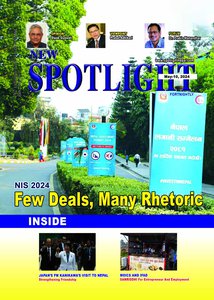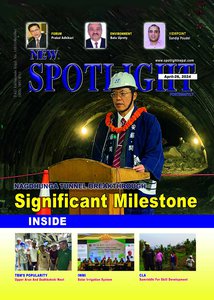March 20 is the International Day of Happiness and this year's theme is Happier Together, focusing on what we have in common, rather than what divides us.
Starting in 2013, the philosophy behind Happiness Day is that fulfilment of basic human right that happiness is a fundamental human goal. There is no poverty, there is equality, and there is protection of the environment. These goals are pursued through “sustainable development” efforts globally, and is relevant to Nepal with the motto of Prosperous Nepal, Happy Nepali.
Nepal is endowed largely with human, social and natural assets for prosperity. Building on these assets, we need to develop physical and financial assets for happiness. There is a vision, but lacks mission and values.
I don’t want to sound technocratic here by discussing rosy plans and programs, but wish you highlight less visible aspects of human conditions, human relations and human networks.
People are developing fatalistic “ke garne” attitude, which is against prosperity and happiness. Ke garne (what to do?) attitude has developed fatalistic mindset of the people contributing to hierarchical power structures and exclusions. Lack of trust in formal structures have given rise of syndicates as informal institutions benefiting only a handful of people.
Syndicate is thriving in every sector in Nepal – health, education, transportation, construction and procurement. Syndicate is breeding institutional corruption. We need to destroy syndicate in order to bring prosperity and happiness in the country and give its way for attaining inclusive double-digit economic growth by the next couple of years.
My first point here is to change fatalistic attitude, be change agents and hold the government accountable to destroy syndicate culture.
Politicians are developing centralized “je garda ni hunchha” attitude, which is also against prosperity and happiness. Je garda ni hunchha (impunity) attitude has developed centralized mindset of the politicians that anything can be done without accountability.
Centralized federalism is constraining development. Kathmandu political culture and bureaucracy are trying to keep power and resources within it wherever possible. We need to break centralization and ensure political will for devolution of authority and resources. The political leadership must be clear about the distinction between the national issues and needs, and provincial and local issues and needs.
My second point here is to break centralized federalism, and be supportive of governance system of self-rule at the local level and shared-rule at the national level by removing parallel authorities in the districts and provinces.
In summary, what is needed is action for prosperity and happiness. We need hard work, loyalty, high sense of responsibility and integrity in political culture and bureaucracy to develop physical and economic assets. We need responsible citizen. We need high level of confidence in the formal structure, and increased civil society space in rights based advocacy for voice and participation of people in governance processes.
- Nepal Investment Summit: Unlocking Economic Potentials For Growth And Development
- Apr 28, 2024
- Investing In Women: Accelerating Progress
- Mar 10, 2024
- Embracing The 'Empty Chair: Advancing Global Inclusivity And Equitable Development
- Dec 29, 2023
- Mental Health In Youth
- Jul 16, 2023
- Controversial Constituency Development Fund in Nepal: Public Concerns
- Jun 18, 2023

















